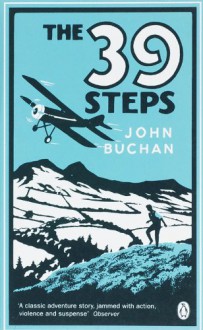
This is the second of John Buchan's WWI spy thrillers featuring British colonial hero supreme Richard Hannay (he's South African, but possesses all the Empire's virtues). Unlike The Thirty-Nine Steps, which is placed in the run-up to the war, this story throws Hannay and his various associates right into the war itself, though not as regular soldiers but again as spies. The climactic scene, however, is very much a battlefield (an actual battle between the Turks and the Russians, near Erzurum).
Whereas Hannay was essentially a sole actor for most of The Thirty-Nine Steps, Buchan chose to give him a team of misfit genius comrades in this one (an American spy taking cover under American stereotypes, and pretending to US neutrality; a half-mad Englishman integrated into the Arab/Muslim world who might well be a sort of Lawrence of Arabia - or at least that's who I thought of when I read the description - and a Dutch/Boer sidekick with a genius for melting into a role and undertaking direly dangerous message deliveries). I think this was an improvement, allowing as it did for a lot more colour in the characterizations.
Unlike The Thirty-Nine Steps, too, this novel has a major female presence in the form of a villain named Hilda von Einem, a mysterious German whose mission, it appears, is to stir up Germany's Muslim allies to jihad against the English (and, I suppose, the Russians, who were the more direct foe to the Ottoman empire in this part of the conflict). I didn't much care for Hilda, who seemed to be less of a strategist than a quasi-divine force of cool sexuality - in other words, she was the kind of woman only a man could imagine. It did seem rather odd that she proved to be mortal just like the men in the face of artillery bombardments at the end (pardon the spoiler).
However, like its predecessor, this was a tale full of incident. Also like its predecessor, it contained a fair bit of hard-to-swallow racism (made more obvious because of the setting in foreign lands). I marked for myself this little gem, where Hannay is talking about his ability to lead a riverboat crew (in Germany, if I recall correctly): "I could see that I was becoming rather a figure in the captain's eyes. He liked the way I kept the men up to their work. I hadn't been a nigger-driver for nothing." Ouch.
Finally, even though I wasn't much of a fan of Hilda, I found the American's musings about her, and about American women and how they were perceived, somewhat interesting: "I guess we Americans haven't got the right poise for dealing with that kind of female. We've exalted our womenfolk into little tin gods, and at the same time left them out of the real business of life. Consequently, when we strike one playing the biggest kind of man's game we can't place her. We aren't used to regarding them as anything except angels and children." This is in 1915; it makes an interesting contrast to the view of American women only a few years later, in Sinclair Lewis' Free Air.

 Log in with Facebook
Log in with Facebook 







